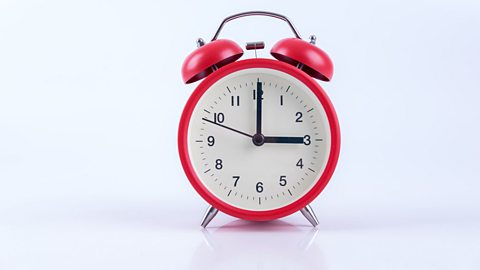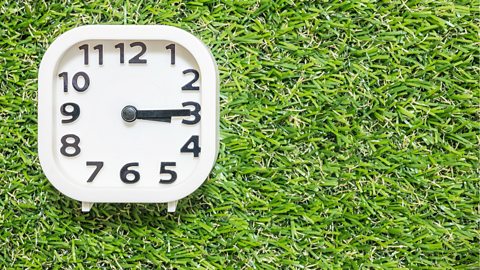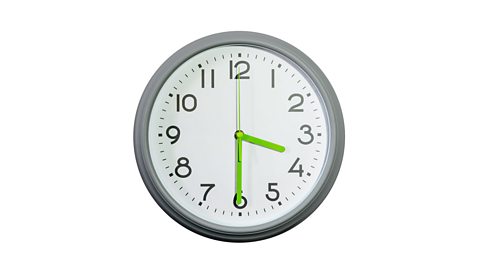Telling the time in Spanish.
What time is it? - ¿Qué hora es?
It’s three o’clock - son las tres.
In Spanish you say son and las before the time.
Son las ocho.
Son las nueve.
The only time you don’t is when it’s one o’clock, then you say es la una.
But you’ll want to say more than that.
Son las dos y cuarto - it’s quarter past two.
Son las dos y media - it’s half past two.
Son las tres menos cuarto - it’s quarter to three.
But that could be three in the afternoon or three in the morning.
There are ways to tell them apart.
Son las tres y cuarto…de la mañana - in the morning.
Son las tres y cuarto…de la tarde - in the afternoon.
And for night you say de la noche.
Son las nueve de la noche.
With all this information, you’ll always be on time.
Saying what time it is - on the hour
To find out what the time is, ask ¿Qué hora es? - What time is it?
Reply with son las followed by a number to say the time on the hour.
For example:
¿Qué hora es? - What time is it?
Son las dos - It is two o’clock.
¿Qué hora es?
What time is it?
Son las dos.
It is two o’clock.
However, for one o’clock use es la instead of son las.
For example:
¿Qué hora es? - What time is it?
Es la una - It is one o’clock.
¿Qué hora es?
What time is it?
Es la una.
It is one o’clock.
Here is a reminder of useful numbers to help you to say the time in Spanish.
| Spanish | English |
|---|---|
| uno (una when telling the time) | one |
| dos | two |
| tres | three |
| cuatro | four |
| cinco | five |
| seis | six |
| siete | seven |
| ocho | eight |
| nueve | nine |
| diez | ten |
| once | eleven |
| doce | twelve |

Saying what time it is - quarter past, half past and quarter to
To say the time in Spanish, say the hour first followed by a phrase or number.
To say quarter past (y cuarto), half past (y media) and quarter to (menos cuarto) the hour, add these phrases to ‘on the hour’ phrases.
For example:
Son las diez y cuarto - It’s quarter past ten.
Son las diez y media - It’s half past ten.
Son las diez menos cuarto - It’s a quarter to ten.

Son las ocho y cuarto
It's quarter past eight (in the morning).
Son las doce y media
It's half past twelve (in the afternoon).
Son las siete menos cuarto
It's quarter to seven (in the morning).
Minutes to and past the hour
To say minutes past the hour or minutes to the hour, add these phrases to the hour.
| Spanish | English |
|---|---|
| y cinco | five past |
| y diez | ten past |
| y veinte | twenty past |
| y veinticinco | twenty-five past |
| menos cinco | five to |
| menos diez | ten to |
| menos veinte | twenty to |
| menos veinticinco | twenty-five to |
For example:
Son las nueve y diez - It is ten past nine.
Es la una menos veinte - It is twenty to one.

Saying what time it is - in the morning, the afternoon and the evening
In Spain, people often say de la mañana (in the morning), de la tarde (in the afternoon, from 13:00 until 18:00), and de la noche (in the the evening, from when it gets dark until midnight).
For example:
Son las ocho de la mañana - It’s eight o'clock in the morning.
Son las tres y media de la tarde - It’s half past three in the afternoon.
Son las nueve y cuarto de la noche - It’s quarter past nine in the evening.

Saying what time it is - the 24 hour clock
You may find that the 24 hour clock is used for timetables, television or film listings or hours that a shop is open.
For example:
Son las trece quince - It's 13:15.
Son las diecisiete treinta - It's 17:30.
Son las veintiuna cuarenta y cinco - It's 21:45.
Son las cero diez - It's 00:10.
Saying at what time things happen
Use a las + the time to say when something happens.
For example:
Desayuno a las siete - I have breakfast at seven o'clock.
Ceno a las seis y media - I have dinner at half past six.
Because 'one o’clock' is singular, remember to use a la, instead of a las.
For example:
- Como a la una y media - I eat at half past one.
Describing daily routine
To describe what you do during the day and at what time, you may need to use some reflexive verbs.
Reflexive verbs are verbs that talk about, demonstrate or describe an action that is being done to the person who is carrying out the action, like saying for example ‘to myself’, such as ‘I wash myself’.
For example:
Me levanto a las ocho menos cuarto - I get up at quarter to eight.
Me lavo a las ocho - I get washed at eight o'clock.
Me acuesto a las nueve y media - I go to bed at half past nine.

Other useful verbs include:
Voy al colegio a las ocho menos cuarto - I go to school at quarter to eight.
Llego a casa a las tres y media - I get home at half past three.
Juego al fútbol en el parque a las cinco - I play football in the park at five o'clock.
A las seis hago los deberes - At six o'clock I do my homework.

Have a look at this downloadable vocabulary list to see more useful words to describe your daily routine
Click on the activity below to see how much you know about telling the time.
Watch the video and test your understanding of telling the time in Spanish in this short quiz!
More on Topics
Find out more by working through a topic
